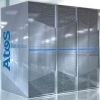 AI will benefit Oracle as companies seek to build their specialised versions of GenAI programs such as ChatGPT.
AI will benefit Oracle as companies seek to build their specialised versions of GenAI programs such as ChatGPT.
Oracle co-founder and chief technology officer Larry Ellison said one project that Oracle could provide was a vector database containing anonymised electronic health records and other specialised training data for healthcare companies.
“You can’t build these AI models without enormous training data. If anything, generative AI has shown that the big issue about training one of these models is just getting this vast amount of data ingested into your GPU supercluster. It is a huge data problem, in the sense that you need so much data.”
His remarks came during the US-based database and cloud products vendor’s Q1 earnings call to report results for its first fiscal quarter.
Still, despite the AI enthusiasm and growth across Oracle’s cloud offerings, the vendor’s stock tumbled after hours due to less revenue generated in the quarter than analysts expected.
Oracle reported $12.45 billion for the quarter, $20 million below expectations.
Oracle CEO Safra Catz put part of the blame for the vendor’s revenue miss on currency exchange rates, electronic medical system provider subsidiary Cerner, and data centre construction.
Catz said that Oracle’s “biggest challenge” is “building data centres as quickly as possible” to meet demand.
Oracle’s executives on the call tried to quell concerns by pointing to business wins.
Ellison said that the nine utility companies owned by Warren Buffett’s holding company, Berkshire Hathaway, are replacing existing enterprise resource planning (ERP) systems and standardising on Oracle Fusion Cloud applications.
Ellison estimated that Oracle has 95 per cent of the cloud ERP market for live customer use.
Ellison said that AI development companies – including Elon Musk’s xAI – have signed contracts to purchase more than $4 billion of AI training capacity in Oracle’s Gen2 Cloud.
Oracle’s remote direct memory access (RDMA) interconnected Nvidia superclusters are a differentiator for the vendor.
They train AI models twice as fast at half the cost of other clouds, Ellison said, without naming competitors.





